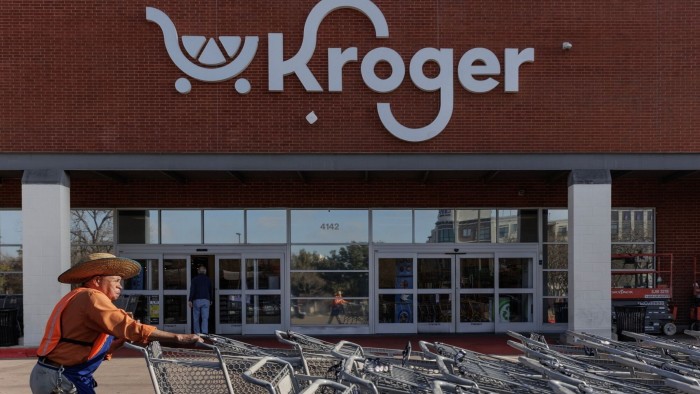Unlock the Editor’s Digest for free
Roula Khalaf, Editor of the FT, selects her favourite stories in this weekly newsletter.
The largest supermarket merger in US history has been blocked by a federal judge, handing a victory to federal antitrust regulators who argued Kroger’s $24.6bn purchase of Albertsons would harm consumers and workers.
US district judge Adrienne Nelson in Oregon on Tuesday imposed a preliminary injunction on the takeover, which sends the proceedings to the Federal Trade Commission for further consideration. The decision, which followed a trial earlier this year, diminishes the odds of the deal being completed.
Kroger agreed to buy Albertsons for $34.10 a share in October 2022. The FTC, eight states and the District of Columbia sued to block the deal in February, arguing the combination risked higher prices for consumers and weaker bargaining power for the companies’ unionised employees.
The deal between Kroger and Albertsons would place thousands of stores under a single owner and consolidate their footprint in certain regions. The companies have argued they need to merge to withstand competition from retail behemoths such as Walmart, Costco and Amazon.
But Nelson concluded “the merger would lead to undue market concentration in multiple geographic markets in both the supermarkets and large-format stores markets that would presumptively lessen competition”.
Grocery prices have risen more than a quarter in the past five years, reflecting transport bottlenecks, labour shortages, commodity costs and strong demand from consumers. Food inflation became a central theme of the US presidential race and put the nation’s two biggest supermarket operators under a microscope.
The FTC on Tuesday said: “Today’s win protects competition in the grocery market, which will prevent prices from rising even more. This statement win makes it clear that strong, reality-based antitrust enforcement delivers real results for consumers, workers and small businesses.”
The federal case was one of three challenging the deal. The attorneys-general of Colorado and Washington separately filed lawsuits alleging harm in their states’ courts.
The judge in the Washington case, Marshall Ferguson, issued a permanent injunction against the merger later on Tuesday, writing that “providing complete relief to Washington consumers necessarily requires an injunction that blocks the deal as a whole”. He said his decision was permitted under the US Constitution.
Kroger and Albertsons said they were reviewing their options. “We believe we clearly outlined during the proceedings how the proposed merger would expand competition, lower prices, increase associate wages, protect union jobs and enhance customers’ shopping experience,” Albertsons said.
Wall Street has for months put a low probability on the deal being approved, with Albertsons shares trading at a roughly 40 per cent discount to the agreed deal price. They dropped 2.3 per cent after the federal ruling to $18.51. Kroger shares rose 5.1 per cent to $60.73.
The companies, which together have nearly 5,000 stores, pledged to divest 579 of them to address competition concerns. But labour groups had questioned the credentials of the buyer, C&S Wholesale Grocers, a relatively small player in the US retail supermarket industry.
Nelson agreed, writing: “There are serious concerns about C&S’ ability to run a large-scale retail grocery business that can successfully compete against the proposed merged business, as would be required to offset the competitive harm of the merger.”
The federal decision is a success for the FTC under chair Lina Khan, an appointee of President Joe Biden who has taken an aggressive position on antitrust enforcement. Khan is expected to be replaced after president-elect Donald Trump is sworn in next month.
Additional reporting by Stefania Palma in Washington

